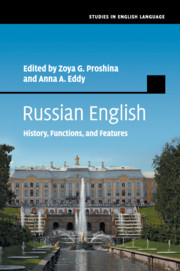Book contents
- Russian English
- Studies in English Language
- Russian English
- Copyright page
- Dedication
- Dedication
- Contents
- Figures
- Tables
- Contributors
- Book part
- Glossary
- Introduction
- I Russian English as a Variety
- II Domains of English Use in Russia
- III Attitudes of Russian Speakers toward Russian English
- Afterword
- References
- Index
- References
References
Published online by Cambridge University Press: 05 September 2016
- Russian English
- Studies in English Language
- Russian English
- Copyright page
- Dedication
- Dedication
- Contents
- Figures
- Tables
- Contributors
- Book part
- Glossary
- Introduction
- I Russian English as a Variety
- II Domains of English Use in Russia
- III Attitudes of Russian Speakers toward Russian English
- Afterword
- References
- Index
- References
- Type
- Chapter
- Information
- Russian EnglishHistory, Functions, and Features, pp. 264 - 303Publisher: Cambridge University PressPrint publication year: 2016



